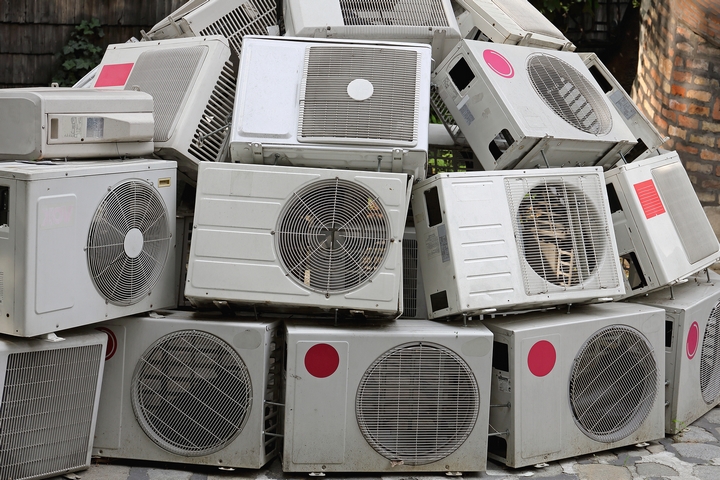With an estimated 5.4 million units shipped in 2019, air conditioners are one of the most popular household appliances in the United States. However, air conditioners, like all appliances, have a limited operating life, and at the end of the cycle, they are simply too inefficient and environmentally damaging to be kept running.
This is especially true with pre-2000 models, which did not meet the same high manufacturing and production requirements as modern versions. This resulted in a significantly shorter operating life than modern air conditioners, forcing early disposal. Every year, almost nine million refrigerators/freezers, six million window air conditioners, and roughly one million dehumidifiers are discarded! You can take some precautions to extend the life of your air conditioner, but air conditioner replacement will inevitably occur at some point.
There is one restriction to getting rid of an air conditioner. It’s not as simple as putting it out for your rubbish collector to collect and dispose of. If you’re familiar with how an air conditioner works, you’ll notice that the refrigerant plays a crucial role in the process, which is why air conditioner disposal must follow a strict set of government guidelines.
To sum it up, throwing your air conditioner in the trash is unlawful, which is why learning how to properly dispose of your air conditioner is important.
So, how do you get rid of an air conditioner? Let’s get down to business!
Why Should We Be Concerned with Air Conditioner Disposal?
Why is it illegal to dispose of an old air conditioner, you might wonder? What is it about the refrigerant that makes it so dangerous?
The solution is straightforward. You’ve probably heard of hydrochlorofluorocarbon (HCFC), hydrofluorocarbon (HFC), and chlorofluorocarbon (CFC) (CFC). These molecules are known as greenhouse gases and make up air conditioner refrigerants. Except for HFC, all of these gases contribute to ozone depletion and are hence particularly hazardous to the environment. If you throw your air conditioners in the trash, the refrigerants will leak, causing the ozone layer to deplete faster and increasing global warming.
But what impact do these greenhouse gases have on the environment? According to one expert, discharging the refrigerant from one air conditioner is the equivalent of traveling 3,000 miles across the United States in your car.
Even while much has been done to reduce the adverse effects of refrigerants, there is still much more to be done. R-410A is a refrigerant used in newer air conditioners. Despite the fact that this type of refrigerant has no effect on the ozone layer, it nevertheless adds to the greenhouse effect. R-22, a significantly more powerful refrigerant, was utilized in older models. R-22 contains compounds that are harmful to the ozone layer and is gradually being phased out in favor of R-410A.
How to Dispose of an Air Conditioner Properly

Air conditioner disposal techniques are largely the same, whether it’s a window air conditioner or a mini-split. They are also affected by your geographic location. However, no matter where you decide to dispose of your air conditioner, it will be done by trained personnel. Do not attempt to do the same job at home, since this could result in significant harm and damage to the environment.
Take a look at some of the options for getting rid of your air conditioner:
Take It to a Scrap Yard
Air conditioner disposal is handled by qualified scrap yards in accordance with EPA standards. You can learn more about available facilities by visiting your local government’s website or exploring the EPA’s Responsible Appliance Disposal (RAD) partners. The EPA has recognized these locations as being capable of fulfilling the disposal task.
Locate a Rebate Program
Most local utilities and state governments now provide refunds to customers who trade in their old, inefficient air conditioners for newer, more efficient models. This manner, you not only save money on a new air conditioner, but you also get your old one carefully disposed of. This campaign encourages air conditioners to be properly disposed of. Contact your electrical provider to learn more about initiatives available in your area.
Consult Your Local Waste Disposal Company
Your local sanitation service is frequently informed about how to properly dispose of old air conditioners. They might have a distinct air conditioner disposal area set aside for this purpose, as well as certified technicians and personnel. They could also be working with a third-party agency to complete the task. Always double-check with your local sanitation department first.
Consider Using a Retailer Exchange
Retailers and distributors may be able to assist you. If you go out to buy a new air conditioner, the shop may offer you the option of returning your old air conditioner and receiving a rebate, similar to a utility. The retailer is then in charge of disposing of the item properly.
Recycle And Be Environmentally Conscious

Perhaps the most noble option. Donate your old air conditioner to a local shelter or charity. Rather than buying a new one and suffering additional fees, they would be grateful to receive a working air conditioner for a fraction of the price. You may be eligible for tax benefits in addition to the mental satisfaction of donating to a good cause.
Your Old Air Conditioner Can Be Refurbished

If you don’t want to get rid of your air conditioner entirely, you can restore it to its former glory. You could hire a trained contractor to recondition your air conditioner. In most cases, aged air conditioners cause some typical problems, and you will be inclined to replace them. This can be costly to your budget, costing up to a thousand dollars.
Refurbishing your old air conditioner often entails topping up the refrigerant, replacing any pipe leaks, repairing the condenser fans and fins, and cleaning the internal components thoroughly.
However, keep in mind that air conditioners built prior to 2010 cannot be refurbished because they use the R-22 refrigerant line, which has been phased out. Converting an older air conditioner to be compliant with R-410A is also not a possibility because the two systems are incompatible.
Be a Conscious Citizen!

The ideal situation is to keep your air conditioner in good working order so that it can last as long as possible. However, as with other appliances, we will have to dispose of it at some point. There should be several options for disposing of old air conditioners. Whatever alternative is chosen, we must be aware of the influence our lifestyle has on the environment and do our share to mitigate the negative consequences of our decisions. Proper air conditioner disposal is a crucial factor in this regard, and we can take steps to limit those adverse impacts by following environmental laws and regulations.







GIPHY App Key not set. Please check settings